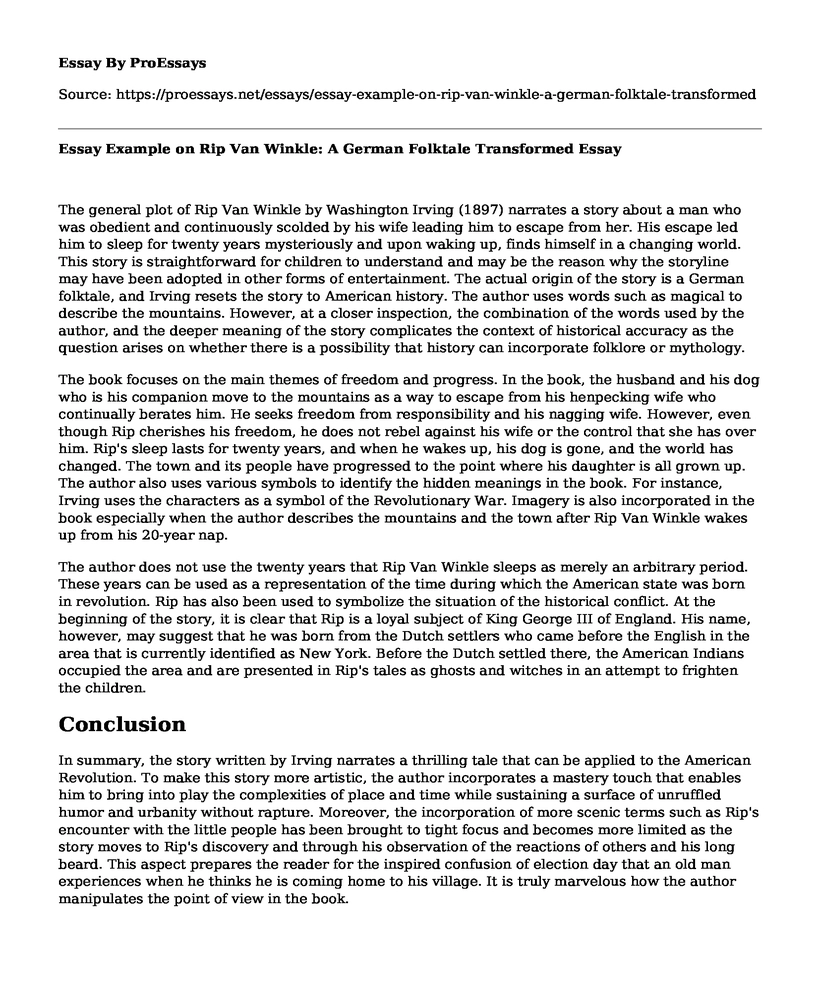The general plot of Rip Van Winkle by Washington Irving (1897) narrates a story about a man who was obedient and continuously scolded by his wife leading him to escape from her. His escape led him to sleep for twenty years mysteriously and upon waking up, finds himself in a changing world. This story is straightforward for children to understand and may be the reason why the storyline may have been adopted in other forms of entertainment. The actual origin of the story is a German folktale, and Irving resets the story to American history. The author uses words such as magical to describe the mountains. However, at a closer inspection, the combination of the words used by the author, and the deeper meaning of the story complicates the context of historical accuracy as the question arises on whether there is a possibility that history can incorporate folklore or mythology.
The book focuses on the main themes of freedom and progress. In the book, the husband and his dog who is his companion move to the mountains as a way to escape from his henpecking wife who continually berates him. He seeks freedom from responsibility and his nagging wife. However, even though Rip cherishes his freedom, he does not rebel against his wife or the control that she has over him. Rip's sleep lasts for twenty years, and when he wakes up, his dog is gone, and the world has changed. The town and its people have progressed to the point where his daughter is all grown up. The author also uses various symbols to identify the hidden meanings in the book. For instance, Irving uses the characters as a symbol of the Revolutionary War. Imagery is also incorporated in the book especially when the author describes the mountains and the town after Rip Van Winkle wakes up from his 20-year nap.
The author does not use the twenty years that Rip Van Winkle sleeps as merely an arbitrary period. These years can be used as a representation of the time during which the American state was born in revolution. Rip has also been used to symbolize the situation of the historical conflict. At the beginning of the story, it is clear that Rip is a loyal subject of King George III of England. His name, however, may suggest that he was born from the Dutch settlers who came before the English in the area that is currently identified as New York. Before the Dutch settled there, the American Indians occupied the area and are presented in Rip's tales as ghosts and witches in an attempt to frighten the children.
Conclusion
In summary, the story written by Irving narrates a thrilling tale that can be applied to the American Revolution. To make this story more artistic, the author incorporates a mastery touch that enables him to bring into play the complexities of place and time while sustaining a surface of unruffled humor and urbanity without rapture. Moreover, the incorporation of more scenic terms such as Rip's encounter with the little people has been brought to tight focus and becomes more limited as the story moves to Rip's discovery and through his observation of the reactions of others and his long beard. This aspect prepares the reader for the inspired confusion of election day that an old man experiences when he thinks he is coming home to his village. It is truly marvelous how the author manipulates the point of view in the book.
Reference
Irving, W. (1897). Rip Van Winkle.
Cite this page
Essay Example on Rip Van Winkle: A German Folktale Transformed. (2023, Jan 03). Retrieved from https://proessays.net/essays/essay-example-on-rip-van-winkle-a-german-folktale-transformed
If you are the original author of this essay and no longer wish to have it published on the ProEssays website, please click below to request its removal:
- Hidden Figures, the Silence in Audacity Essay
- Character Analysis Essay on Nora From "A Doll's House"
- Essay on Beloved: Examining the Destructive Legacy of Slavery
- Paper Example on The Wife of Bath's Tale: A Vivid Exploration of Feminism Through Literary Devices
- Free Essay Example on Donne's Death, Be Not Proud: An Exploration of Mortality
- Identity in the House on Mango Street - Essay Sample
- The Ideas of Melancholy - Essay Sample







